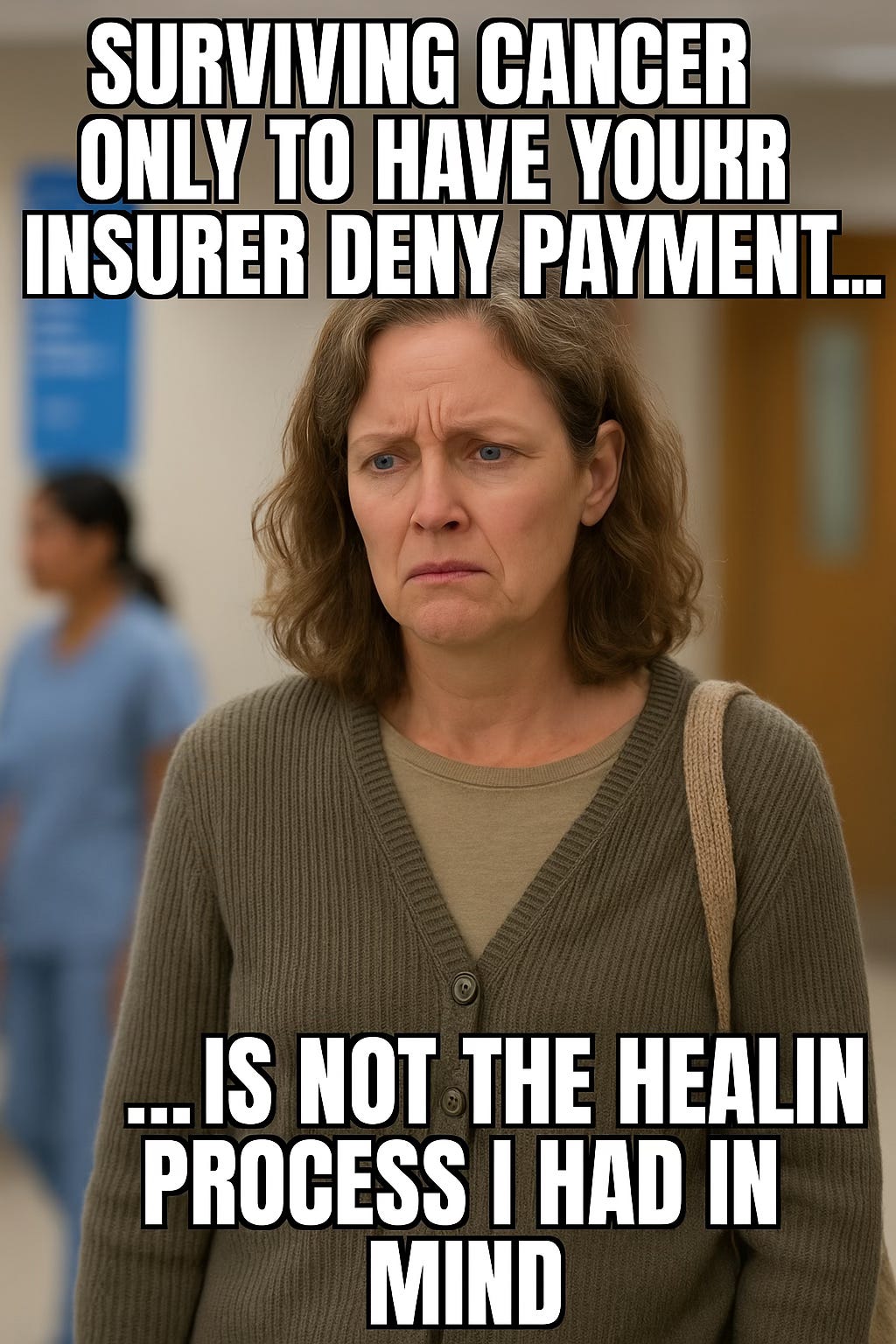When Your Insurer Refuses to Pay: The Hidden Financial Crisis in Breast Cancer Care
Building on the ProPublica expose published April 12, 2025
After reading ProPublica's shocking investigation "Slow Pay, Low Pay or No Pay," I felt compelled to share what this landmark case means for anyone navigating breast cancer treatment—or any complex medical care.
Imagine surviving cancer, only to be left fighting your insurer instead of healing your body. That's precisely what happened to thousands of women—including Witney Arch, a mother of four and preschool teacher—who trusted Blue Cross to cover their medically necessary breast reconstruction surgeries.
ProPublica's investigation revealed that the insurer had authorized their care at a world-renowned reconstruction center and refused to pay the bills. A jury recently called it what it is: fraud, awarding the Center for Restorative Breast Surgery over $421 million in damages. I learned about this Center when a friend was choosing where to have her DIEP flap reconstruction after FAILED implants. My fabulous and brilliant reconstructive surgeon confirmed that the Center for Restorative Breast Surgery surgeons are brilliant, world-class, and incredibly focused on making cancer patients post-treatment life good.
The Insurance Game No One Prepares You For
This case exposes a pattern that's all too common yet rarely discussed openly: insurers using "slow pay, low pay, or no pay" tactics to minimize their financial obligations while maximizing their profits.
As someone who's navigated breast cancer treatment and supported countless others through their journeys, I've seen how devastating this financial double-cross can be.
What ProPublica uncovered at trial was disturbing: Blue Cross executives testified under oath that "prior authorization" doesn't guarantee payment. The company maintained secret "targeted" and "blocked" provider lists that subjected certain physicians to special scrutiny, resulting in delayed payments or outright denials.
Even more troubling, the investigation revealed that Blue Cross had a financial incentive to pay as little as possible—they received a percentage of the "savings" when handling claims for out-of-state Blue Cross plans. Most people who go to the Center for Restorative Breast Surgery are out of state.
What This Means for You
When I received my cancer diagnosis, I thought the most significant battle would be the disease itself. I quickly learned that navigating insurance could be almost as challenging—and I was one of the lucky ones with good coverage.
For women like Witney Arch, the consequences were more severe. After choosing the specialized care she needed, she received disturbing calls from her insurer trying to pressure her into cheaper alternatives. When she stood her ground, Blue Cross paid just a tiny fraction of her bills—in one case, just $8,580 of a $102,722 surgical charge.
The Center absorbed these unpaid balances rather than passing them to patients. But most medical providers can't afford to do this, leaving patients with devastating medical debt on top of cancer recovery.
Protecting Yourself in a Broken System
If you're facing cancer treatment or supporting someone who is, here are crucial steps to take:
Get authorization details in writing. Ask specifically what percentage will be covered and whether "authorization" guarantees payment.
Question the fine print. If you receive documents with disclaimers about payment not being guaranteed, address this directly with your insurer before proceeding.
Document everything. Record phone calls (where legal) or take detailed notes, including representative names, dates, and specific promises.
Know your rights. Federal law requires private insurers to cover breast reconstruction after mastectomy. Use this as leverage if needed.
Prepare financially. Build a comprehensive picture of potential costs, including what your insurance might refuse to cover.
The True Burden of Cancer Care
During my treatment, I discovered that cancer imposes not just physical and emotional tolls but an administrative one too. Patients spend an average of 21.5 hours per month dealing with insurance and financial aspects of their care—time that should be spent healing and being with loved ones. Try my free financial impact calculator if you want help estimating and planning.
What's particularly galling about this case is how cavalier insurance executives were about their denial practices. According to ProPublica's report, the Blue Cross admitted that it had never even considered the thousands of appeals filed by the Center. They decide what they will pay, regardless of actual costs or patient needs.
In court, executives justified their actions as keeping premiums low for members. But as Dr. Scott Sullivan, co-founder of the Center, noted, there was a stunning hypocrisy: Blue Cross executives had signed special agreements to fully cover their own wives' cancer treatments at the very same center.
What Happens Next?
While Blue Cross is appealing the verdict, this case represents a rare win against systemic insurance abuses. Most patients and providers lack the resources to fight multi-year legal battles against insurance giants.
The jury forewoman later told reporters they "would have given more if we had been asked for more. That's how egregious the fraud was."
This verdict won't immediately change how insurers operate, but it does shine a light on practices that have long operated in the shadows. It’s ammunition to challenge payment denials. It may eventually force legislation to strengthen the meaning of "authorized" care.
For now, as cancer patients and survivors, we need to share our stories, support each other through these financial battles, and demand better from a system that too often fails us when we're most vulnerable.
Have you experienced insurance struggles during cancer treatment? What strategies helped you navigate the financial maze? I'd love to hear your experiences in the comments.




